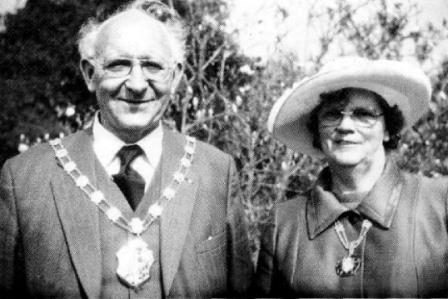The following was written by Kenneth Morgan, Mr. Morgan’s Son. Most of my memories of Mr. Morgan revolve around Sunday School, where for some time I was his pupil, and for some time I’m sure I was nothing but a pain in the neck for Mr. Morgan.
It is with great respect that we invited Mrs. Morgan, to plant a tree in his memory at the Playing Fields this August – Richard Rowles.
John Morgan was born in Wandsworth, London on 12th May 1919 growing up in this area of London. He went to school at S1. Paul’s where he was an outstanding miler, and his first links with this part of Hampshire began when his father rented a farm at Fullerton. This led to a move to Wherwell (Yew Tree Cottage) when he married Grace Barnes in. April 1943. Their romance had begun when they first met blackberrying near Swanage aged 5. From their wedding day they both became very much part of all that went on in Wherwell.
He was the Scoutmaster, the garden farmer – Yew Tree Cottage had pigs and hundreds of chickens – but his real interest always appeared to be in milk. In the late forties he bought a couple of rounds and Andover Creameries was born. The dairy grew and expanded becoming the first to sell bread. The horse-drawn milk floats were gradually replaced by the battery operated type which served Wherwell.
He didn’t just serve Wherwell with milk, In 1947 he joined the Wherwell Parish Council which he remained on until his death. In 1950 he was elected to the Andover Rural District Council which began his career in local government at all levels; parish, district, borough, county, national and international and lasted for over half a century.
At his funeral the late Michael Colvin in giving a public appreciation said, “When I first met him on Andover Rural District Council 35 years ago, his presence loomed. Fifteen years as a councillor, waistcoated, gold chain, solid and dependable, that quizzical look, and the twinkle in his eye. His grasp of local government finance made most of us feel like amateurs in the presence of a professional. However high in municipal politics he went – talking to Presidents and Prime Ministers – he never neglected his grass roots.
Visiting Moscow in the late eighties and discussing Perestroika with Mikhail Gorbachev, John told him “You’ve got it wrong – you cannot impose a new political system from the top down. It must grow organically, so begin by democratising your Town Councils”. Gorbachev didn’t listen and look what a mess Russia is now in.
He also frequently took on Mrs. Thatcher – no mean feat – famously during the debates about the disposal of what remained of council housing stock following the ‘Right to Buy’ sales. John said it was wrong to privatise what was left. He won the argument but the parliamentary votes were lost. This ability to go straight to the top, whilst maintaining interest and involvement with all levels of government was John’s greatest asset.
He used it to good effect on our behalf with the battles with Horace Cutler, the leader of the GLC, when their Andover over-spill houses began to leak like sieves and needed re-roofing. The famous ‘GLC test’ for structural soundness involved a surveyor jumping up and down on a joist. (We were mightily relieved that John resisted the temptation to do the same). Instead, he devised a formula which won our ratepayers a £14.5 million cheque from the GLC to improve the homes.
His commitment to the community was reflected in the variety of his involvements. He was a school governor and chairman of Winton School at his death. Twice he was mayor of Test Valley and was heavily involved in local European politics. He became chairman of the Association of District Councils and then president of the International Union of Local Authorities, a European wide organisation. Despite all of this he did indeed never lose his links with Wherwell. His children started under Mrs. Strugnel at Wherwell school. In 1956 he moved to Dancing Ledge, which was the old bakery and shop. Yew Tree Cottage had been next door to the post office (at this time there was a choice of shops in Wherwell).
Dancing Ledge’s garden had hardly been used since the fire that destroyed the roof in 1899 when water from the river was needed. But like everything the garden was shared with the youth club, the village and various parties and events linked to his council work.
His work and everything he did was based around his faith. He was at the time of his death churchwarden, treasurer and lay reader and had been involved at the village church since 1943. Well into his retirement he was helping teach the Sunday school. He had a real vision for Wherwell. He wanted people that had been born and brought up in Wherwell to be able to live here in their retirement and encouraged the council to make sure genuine Wherwell people were housed in the council’s properties.
He loved sport. He was a season ticket holder at Southampton, enjoyed gardening and spent a lot of time at Swanage where he had a holiday home.
He certainly lived life to the full. He was a big man with a very big heart and very much an adopted son of Hampshire and Wherwell in particular.
Wherwell Anthology 2000 (XXVII)






No Comments
Add a comment about this page